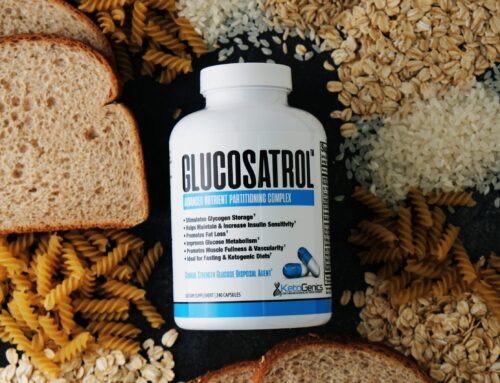Ketogenic Diet and Insomnia
Many low-carb and ketogenic dieters often find sleep to be an issue once they eliminate carbohydrates. Insomnia is a common side effect of the diet but doesn’t have to stop you from following the diet.
One of the reasons for insomnia on keto is from the lack of the amino acid L-tryptophan getting into the brain because of the reduction of carbohydrates. Tryptophan is the precursor of serotonin, serotonin converts to melatonin the sleep hormone. Some people find that taking take some 5HTP, which is a precursor for serotonin to help in this regard.
Very low carb and ketogenic diets may drive serotonin and melatonin low leaving you unable to sleep. It is estimated that 90% of the serotonin is made in the gastrointestinal (GI) tract and reducing carbohydrates or any major diet change often disrupts healthy gut bacteria. Often a good probiotic can help alleviate those issues. In addition, supplemental melatonin may relieve some of the issues that come with low melatonin levels.
This study here https://www.ncbi.nlm.nih.gov/pubmed/18681982; showed that the proportion of rapid-eye movement (REM) sleep to total sleep time was significantly reduced in the very low carb diet group of study participants.
Its common knowledge among keto dieters that adequate intake of electrolytes improves most issues on a ketogenic diet. Just like keto flu is partially due to an electrolyte imbalance, so is trouble sleeping/insomnia on a keto diet.
Magnesium seems to be the most important electrolyte to increase intake of to help get better sleep. 200-400mg before bed is a common dosage.
One thing that seems to be more common among keto dieters than any others is their love of coffee/caffeine. This overstimulation can lead to sleep problems. Limiting coffee would help for sure or stop drinking any caffeine drinks earlier in the day.
Because ketogenic diets involve a reduction of dairy foods, lowered vitamin D levels can be an issue. Researchers analyzed the sleep patterns and Vitamin D levels among a group of men.
https://www.ncbi.nlm.nih.gov/pubmed/28475473 – This study shows that the use of vitamin D supplement improves sleep quality, reduces sleep latency, raises sleep duration and improves subjective sleep quality in people of 20-50 year-old with sleep disorder. In addition, disruption in a persons circadian rhythm can cause sleep issues. Vitamin D can useful for helping restore a natural circadian rhythm.
One product that combines many of these potential remedies and more is Snooze Control.
Last but not least, avoid the use of artificial, blue lighting and electronics at night.
Blue light in the evening disrupts the brain’s natural sleep-wake cycles Smartphone’s, tablets etc emit light of a blue wavelength, this blue light makes your brain function as it if was still daytime. In addition this blue light can also inhibit melatonin production. Here are some ways to reduce blue light at night according to www.health.harvard.edu:
- Use dim red lights for night lights. Red light has the least power to shift circadian rhythm and suppress melatonin.
- Avoid looking at bright screens beginning two to three hours before bed.
- If you work a night shift or use a lot of electronic devices at night, consider wearing blue-blocking glasses or installing an app that filters the blue/green wavelength at night.
- Expose yourself to lots of bright light during the day, which will boost your ability to sleep at night, as well as your mood and alertness during daylight.





